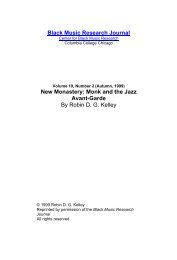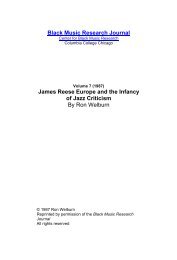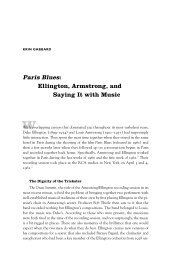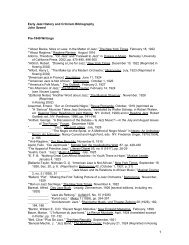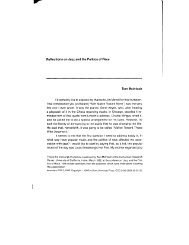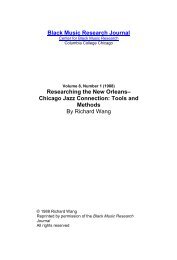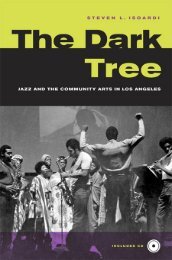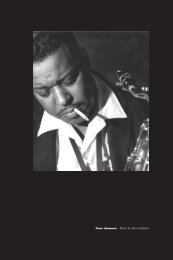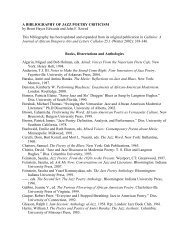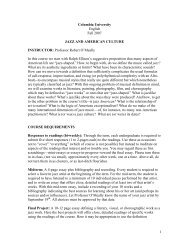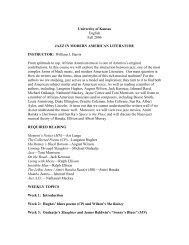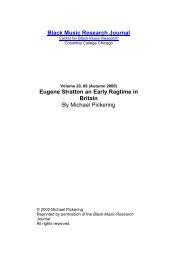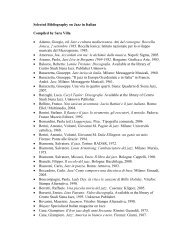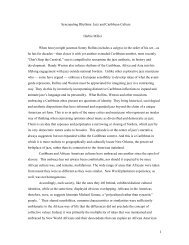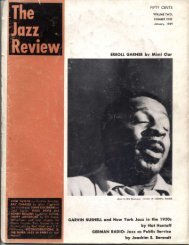The Jazz Review - Jazz Studies Online
The Jazz Review - Jazz Studies Online
The Jazz Review - Jazz Studies Online
Create successful ePaper yourself
Turn your PDF publications into a flip-book with our unique Google optimized e-Paper software.
derstand, considerable influence upon<br />
Miles) is best characterized by the<br />
term "exquisite simplicity" and pits<br />
the solo horn against the varying<br />
combinations of instruments for a<br />
prolonged question-&-answer period.<br />
Mr. Davis plays extremely well<br />
which, for him, is very well indeed.<br />
A quote from the 2nd movement<br />
of Berg's Violin Concerto segues into<br />
<strong>The</strong> Meaning Of <strong>The</strong> Blues—along<br />
about this time I glanced at the liner<br />
notes and was struck by the word<br />
"seductive"—I concur and would add<br />
"shimmering, limpid & nocturnal"—<br />
Gil's use of inner dissonance to create<br />
that moonlit effect is awful nice indeed.<br />
A sterling performance of J.<br />
J.'s Lament moves surprisingly into<br />
a humorous, almost giggling / Don't<br />
Wanna Be Kissed, a relief from romance<br />
for a while. <strong>The</strong> bizarre, rich<br />
orchestration was beginning to wear<br />
a little thin on me by then but I<br />
could easily attribute it to manythings<br />
other than the music, though<br />
there is some validity in the "too<br />
much cherry pie" reaction. <strong>The</strong> record<br />
ends with Berg upside down, resolving<br />
to a more consonant chord<br />
and there you have it.<br />
—Bob Brookmeyer<br />
J I M M Y ciiFmK A: Travelin' Light,<br />
Atlantic 1282<br />
In the broad, overall contemporary<br />
jazz scene this album may be classified<br />
in a general way as belonging to<br />
the folk jazz movement. Within the<br />
Folk <strong>Jazz</strong> idiom it falls into a category<br />
which Giuffre himself introduced<br />
with his "Tangents" album,<br />
and which, if it must he labeled, and<br />
it must, (labeling and defining being<br />
a vital factor in the process of expanding<br />
human knowledge) then it<br />
might be called "backwoods impressionism."<br />
Correspondingly I'd say<br />
that Giuffre is in the "backwoods<br />
impressionistic" period in his creative<br />
cycle.<br />
By no means should this imply<br />
that Giuffre, in this or any of his<br />
albums, is merely a tone poet writing<br />
music in which the thematic structure<br />
is the arbitrary result of his desire to<br />
capture the color of a cloudless blue<br />
sky on a hot summer day etc. (see<br />
Quiet Time, Teddy Charles Tentet).<br />
However, here he seems to have been<br />
more concerned with conveying one<br />
overall mood that dominates the<br />
emotional content of all the music.<br />
This mood, the mood of the hill<br />
people, prevails during the entire album,<br />
and even Forty-Second Street.<br />
We are allowed to know the hill<br />
people more intimately through vari<br />
ations of the overall mood which<br />
Giuffre introduces in the music from<br />
time to time. For instance as they<br />
rest and contemplate (Creen Country.)<br />
<strong>The</strong>ir vigorous activities are<br />
captured in the camp meeting chants<br />
of Swamp People. Brother Oiuffre is<br />
taken with the holiness tongue and<br />
utters in his ecstacy some phrases of<br />
remarkable rhythmic virility. Brother<br />
Brookmeyer can't contain the spirit<br />
any longer on Pick 'Em Up and<br />
starts preachb' an unaccompanied<br />
jump and shout sermon that would<br />
render any deacon's deliverance of<br />
"Dry Bones" to a chittlin' fed congregation<br />
as downright inhibited.<br />
What this album has to say, it<br />
says superbly. Listening to it, especially<br />
while watching green things on<br />
very late summer afternoons or again<br />
in the A.M. one is apt to be transported<br />
to the folk country where<br />
this music has its origins.<br />
But people have a tendency to get<br />
bored even with the best of their<br />
friends if they see them in the same<br />
context all the time, especially if this<br />
context is essentially uncomplicated.<br />
Complexity is a necessary quality<br />
of growth. Simplicity prevails when<br />
we have settled at a certain level.<br />
<strong>The</strong>refore, I think that there is not<br />
just one overall simplicity but manylevels<br />
of complexity.<br />
For instance, Bartok used the folk<br />
themes of Hungary but he rejected<br />
the idea of recreating folk music in<br />
a newer idiom. Rather he chose to<br />
exalt them in highly complex tonalities<br />
and rhythms and forms. Nevertheless,<br />
his music has a simplicity<br />
and clarity relative to its own high<br />
level of technical complexity.<br />
Bartok is more worthy of our attention<br />
and respect for having suecessfully<br />
accented the challenge of<br />
establishing a profound and harderto-come-by<br />
simplicity. John Benson<br />
Brooks, an extremely talented but<br />
essentially unknown composer (Vik<br />
1083 and a forthcoming Riverside<br />
album) is now doing and for years<br />
has done very interesting things in<br />
the folk lore jazz idiom.<br />
Giuffre, a totally dedicated composer<br />
of enormous integrity and<br />
talent, will probably abandon the security<br />
of his present level and head<br />
outward for distant unchartered<br />
shores. It is a question of whether he<br />
can maintain the simplicity he<br />
cherishes while searching or whether<br />
he will have to sacrifice some of it<br />
for a new beauty.<br />
As for the groups lack of a rhythm<br />
section, Jim Hall plays a rhythm<br />
instrument doesn't he? And all three<br />
"soul brothers" are great supporting<br />
players.<br />
Hall is really marvelous both in<br />
solo and support. Listen to his backgrounds<br />
of minor sevenths plaved<br />
chromatically or his quasi-bass lines.<br />
—George Hussell<br />
HORACE SILVER; <strong>The</strong> Stylings of Silver,<br />
Blue Note BLP 1562<br />
HORACE SILVER : Further Explorations,<br />
Blue Note BLP 1589<br />
Horace Silver's two latest Blue<br />
Note albums, <strong>The</strong> Stylings of Silver<br />
and Further Explorations by the Horace<br />
Silver Quintet, present his group<br />
during Art Farmer's residence with<br />
it. Art is the shining light of both<br />
albums, playing with a warm singing<br />
tone and rich imagination. His strong<br />
lyrical sense dominates the minor<br />
Pyramid and the bluesy SoulvUle and<br />
his ballad choruses on My One and<br />
Only Love and /// Wind are especially<br />
beautiful. He plays his parts on<br />
the arrangements with superb taste,<br />
making ordinary melodies sound extraordinary,<br />
and giving an extra rich¬<br />
ness to good ones.<br />
Of the twelve tunes on these two<br />
albums, ten are originals by Horace.<br />
His medium tempo melodies are attractive,<br />
and some of the things he<br />
has done with meter are logical and<br />
interesting. I don't enjoy his conception<br />
of up tunes. A rigid choppiness<br />
exists both in his writing and<br />
playing at those tempos; fast tunes<br />
should he relaxed and should soar.<br />
On <strong>The</strong> Outlaw and Home Cooking<br />
he plays more smoothly, but in general<br />
his writing shows more imagination<br />
than his improvising. He keeps<br />
a certain rhythmic sparkle going, but<br />
seems to be satisfied with melodic<br />
banalities much of the time. His ballad<br />
conception is strange: he plays<br />
a separate fragment of melody on<br />
each chord with little interconnection<br />
other than what naturally comes with<br />
the progression.<br />
Hank Mobley plays competently on<br />
the Stylings album. <strong>The</strong>re is a lack of<br />
conviction in his solos that robs his<br />
playing of the life it should have. His<br />
ideas are nice, but I never feel that<br />
he is completely involved in his<br />
playing.<br />
On the Explorations album Cliff<br />
Jordan is the tenor player. His style<br />
is blatant and calculated at times, but<br />
he has a fresh straight-ahead approach<br />
to melodic invention that I<br />
like very much.<br />
Teddy Kotick and Louis Hayes<br />
support the group with taste and feeling.<br />
I wish Teddy had been balanced<br />
better; he plays a good line and you<br />
can hear all the pitches, but a little<br />
more volume would have added the<br />
true resonance that exists between



